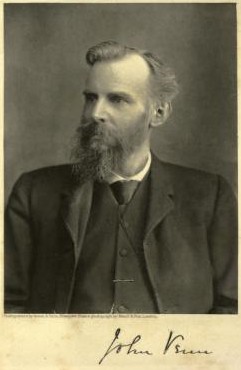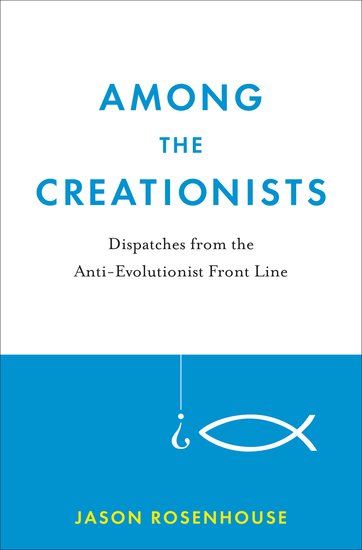By Jason Rosenhouse
 Writing in 1866, the British mathematician John Venn wrote, in reference to the branch of mathematics known as probability theory, “To many persons the mention of Probability suggests little else than the notion of a set of rules, very ingenious and profound rules no doubt, with which mathematicians amuse themselves by setting and solving puzzles.” I suspect many of my students would extend Venn’s quip to the entirety of mathematics. Often they seem to believe, upon entering my classroom for the first time, that a tacit agreement exists between us. They will dutifully memorize whatever rules I give them and apply them with machine-like accuracy at test-time, but to expect anything beyond that is considered a serious breach of etiquette.
Writing in 1866, the British mathematician John Venn wrote, in reference to the branch of mathematics known as probability theory, “To many persons the mention of Probability suggests little else than the notion of a set of rules, very ingenious and profound rules no doubt, with which mathematicians amuse themselves by setting and solving puzzles.” I suspect many of my students would extend Venn’s quip to the entirety of mathematics. Often they seem to believe, upon entering my classroom for the first time, that a tacit agreement exists between us. They will dutifully memorize whatever rules I give them and apply them with machine-like accuracy at test-time, but to expect anything beyond that is considered a serious breach of etiquette.
I held such views myself, once upon a time. That is why my first visit to the annual Joint Mathematics Meetings, as an undergraduate student in the early nineties, was such an eye-opening experience. This is the largest mathematics conference of the year, held every January in a different city. Almost two decades later, I am still consistently amazed by the sheer variety of things that mathematicians study. Browsing through the program for this year’s edition, which is being held in San Diego, I notice that there are sessions on complex dynamics and celestial mechanics. Continued fractions get their own session, as do coverings of the integers, and frontiers in geomathematics. Financial mathematics gets a session. So does graph theory, and also the history of mathematics. If you prefer, you can go in for the real jawbreakers. They have titles like, “Advances in General Optimization and Global Optimality Conditions for Multiobjective Fractional Programming Based on Generalized Invexity.” For me, reading the program is like listening to opera. I may not understand all the words, but it sure sounds good!
This conference is called the Joint Mathematics Meetings, because it is held jointly between the two major mathematics organizations in the United States: The American Mathematical Society (AMS) and the Mathematical Association of America (MAA). The AMS generally concerns itself with the profession of mathematics and publishes several highly prestigious research journals. The MAA, by contrast, generally focuses on the educational aspects of mathematics. The sessions I listed above are directed towards researchers and are organized by the AMS. MAA sessions tend to have gentler titles. This year they are hosting a session on the beauty and power of number theory; another one on writing, talking, and sharing mathematics; still another on mathematics in industry; and, my personal favorite, a session called, “Where Have All the Zeros Gone?”
The sessions, however, are only the tip of the iceberg. There are also keynote talks featuring the alphas of our profession. In my experience, the main purpose of these talks is to remind you that, your PhD notwithstanding, there are mathematicians out there who are way smarter than you are. There is also the employment center, populated by eager job-seekers who stand out clearly from the other conference attendees, because they are well-dressed. There is also the exhibition center, in which every mathematical publisher on the planet shows off its latest books. For an impulse buyer like me, this is a dangerous place.
Which brings me back to the John Venn quote with which I started and the question at the top of this essay. Yes, I suppose we do spend a lot of time setting and solving puzzles. We dutifully apply the rules of proper inference to the abstract objects that have caught our fancy, thereby producing publishable theorems. That, however, is really a very small part of what mathematicians do.
You see, more than anything else, to be a mathematician is to be part of a community. Whatever else it is, mathematics is a social activity undertaken by human beings to further human goals and purposes. The main point of the conference is not to transact mathematical business, though that is certainly important. Rather, the point is to socialize, to renew old friendships, and to engage in casual conversations. The point is to remind you that mathematics is not about ivory tower theorizing, but about being part of a community that is united by its love for, and its belief in the importance of, mathematics. This applies whether your focus is on pure mathematics or applied mathematics. It does not matter whether you prefer teaching, research or community outreach. It includes elementary school teachers showing grade-schoolers the mechanics of basic arithmetic, high school teachers giving students their first taste of higher-level math, and graduate school professors at the frontiers of modern research. It also includes the students who will form the next generation not just of professional mathematicians, but of mathematically informed lay people as well.
All are part of the same community, and all are essential to the continued health of our discipline.
Jason Rosenhouse is Associate Professor of Mathematics at James Madison University. His most recent book is Among The Creationists: Dispatches from the Anti-Evolutionist Front Lines. He is also the author of Taking Sudoku Seriously: The Math Behind the World’s Most Popular Pencil Puzzle with Laura Taalman and The Monty Hall Problem: The Remarkable Story of Math’s Most Contentious Brain Teaser. Read Jason Rosenhouse’s previous blog articles.
Subscribe to the OUPblog via email or RSS.
Subscribe to only mathematics articles on the OUPblog via email or RSS.
Image credit: John Venn. Public domain via Wikimedia Commons.



[…] the conference runs from January 9 – 12 in San Diego. Follow @JointMath and check out this blog post about the conference if you’re unfamiliar with […]
So, Jason, where have all the zeroes gone?
Well written. Specially enjoyed your own quip about, “mathematics is a social activity undertaken by human beings to further human goals and purposes”. I was not the sharpest tool in the shed, but mathematics forced? engaged? helped me to think. In response to another comment, can zeroes be defined? Actually, never imagined it left, or right :)